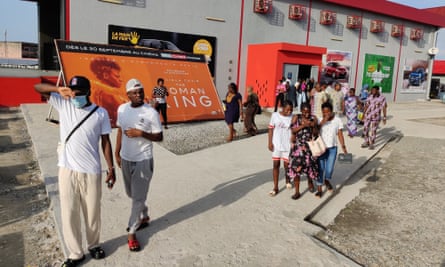At the Canal Olympia in Cotonou – the only cinema in Benin – the audience is on its feet clapping. Havens of tranquillity are few and far between in this buzzing 24-hour city, so this dark, air-conditioned theatre is usually a calming space. Not tonight.
Cinemagoers have just seen the rich history of their country, Dahomey, Benin’s former name, depicted in a Hollywood film: The Woman King. As Viola Davis’s army general, Nanisca, leads Dahomey’s Amazon warrior women against the Oyo empire and Portuguese slave-traders, they cheered, exhorted, laughed and groaned. When we see the port of Ouidah or the royal palaces as they might have looked back then, there are loud gasps of approval.
Today, Ouidah is a charming coastal city where faded colonial buildings in pastel hues line orange-brown dirt roads. Two centuries ago, it was one of west Africa’s largest slave ports on what was then known as the Slave Coast. The royal palaces of the Dahomey kingdom in Abomey are now Unesco world heritage sites – but physically they are ruins: only the tall, thick, earthen walls remain of the original structures. Director Gina Prince-Bythewood’s regal reimagining of these places – ruled over by King Ghezo (John Boyega) – gave 25-year-old student Synthia Onuoha “goosebumps”. Onuoha, whose mother is Beninese and father Nigerian, added: “[The film] revealed many emotions within me, particularly around the slave trade.”
Slavery is little taught in schools in west Africa – much like in Britain – perhaps because processing the role that Africans themselves played in supplying the transatlantic slave trade remains a contentious thing to formalise in local curriculums. The Woman King doesn’t duck the fact that the Dahomeyans and their all-female Amazon regiment captured rivals and sold them to Europeans.
The film does however portray them as heroes determined to change their ways – which has attracted criticism from some quarters. We see Ghezo ruminating over his decision to discontinue supplying slaves to Europeans – which Dahomey did on a huge scale, including captives from the Oyo empire who are portrayed here as the villains striking deals with slave traders. Ghezo decides selling palm oil is the right ethical decision.
It’s a fictionalised version of events, sure. But aren’t all films? “It’s not a documentary,” says local film-maker Aymar Esse. “Was Titanic a factual depiction of that historic event?” Onuoha’s only issue is that she would have liked to see more Beninese people among the cast of American, African and British actors, alongside the Beninese singer Angélique Kidjo who plays a cameo role.
Later I talk to a staff member over the sound of popcorn being made. She is wearing a T-shirt with the word “Agojie” on it – the word for the Amazons in the Beninese language Fon. In real-life, the highly skilled Agojie were deployed against the French army in major 19th-century battles. Bronte Degbelo, 27, has been working on the front desk at Canal Olympia for several years and says she’s never seen an African film bring people together like this. “All age groups come to see the film – parents, grandparents, children. It’s been nearly a month and it’s still sold out.”
Buying tickets for the new DC film Black Adam, Hugues Lokossa, 39, tells me he saw The Woman King in Abidjan in Ivory Coast while on a business trip. So what did Ivorians think? “They didn’t look at it as a movie from Benin but a movie from Africa. They felt ‘this film is talking to us – black people from Africa’. They were really proud – there was a huge line at the box office.”
“I was very proud to see Benin on the big screen. Even though the actors are English-speaking, they used songs and rhythms from our culture and words from one of our main languages – Fon.”
“For people who grew up in Benin there were songs you heard your grandmother sing that you hear in the movie. I can’t sing them myself, but if older people see this film there are songs they will relate to.”
Across west Africa, from Dakar to Lagos, there is a sense of socio-economic momentum and self-confidence about the region becoming a global force. A giant bronze statue of an Amazon warrior was recently erected near Cotonou’s palace of congress, and the presidential palace hosted a spectacular exhibition of Dahomey’s royal treasures, returned by France who looted them after overthrowing the Dahomey kingdom in 1894.
To these local celebrations of identity, The Woman King now lends a global platform. For Africa, where the film scene is dominated by Nollywood, and where African films struggle for billing space, to break into Hollywood in such a powerful way, represents significant progress. And unlike Black Panther, whose sequel is released soon, The Woman King shows a version of fact not fiction. “I loved the first Black Panther movie,” says Lokossa. “It shows what maybe we would have been without any outside influence.”
As the screening ends, an animated audience emerges into the bright sunshine to take selfies next to the Viola Davis poster outside. Women and girls outnumber men and boys by about two to one. “I urge my girlfriends to watch this movie. It strengthens us women,” says Benie de Dieu Soetonve, a 22-year-old law student. “I learned a life lesson that you must have courage and patience. Honestly my emotions are so huge I don’t know what to say. I want to see it again!”

